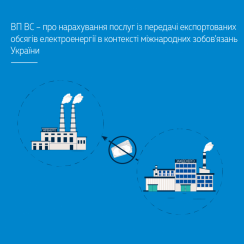Contact center of the Ukrainian Judiciary 044 207-35-46

DTEK Zakhidenergo JSC filed a lawsuit against the National Power Company Ukrenergo on the obligation to terminate actions aimed at accruing electric energy export services under an agreement on the provision of electric energy transmission services and including such services in the primary documents by which they are drawn up. The courts of previous instances granted the claim on the grounds that the defendant’s charging of the transfer services for the export was not provided for under the law in force and under the terms of the transfer agreement concluded by the parties, as well as by the fact that the charging of such a fee violates the international obligations of Ukraine.
Considering the defendant's cassation complaint, the Grand Chamber of the Supreme Court stated that, having acceded to the Energy Community Treaty (the EC Treaty), Ukraine assumed the obligation to comply with the provisions established by this Treaty and the regulatory framework for the transfer of energy products and materials, for the transportation of which networks are used.
The Energy Community Treaty determines that customs duties and quantitative restrictions on the import and export of Network Energy and all measures having equivalent effect, shall be prohibited between the Parties. This prohibition also applies to customs duties of a fiscal nature. Paragraph 1 of Art. 41 of the Treaty does not preclude quantitative restrictions or measures having equivalent effect, justified on grounds of public policy or public security; the protection of health and life of humans, animals or plants, or the protection of industrial and commercial property. Such restrictions or measures shall not, however, constitute a means of arbitrary discrimination or a disguised restriction on trade between the Parties. This provision is obligatory for Ukraine as a Party to the EC Treaty and is subject to application in accordance with Art. 9 of the Constitution of Ukraine and the Law of Ukraine On International Treaties of Ukraine.
According to the Law of Ukraine On the Electricity Market, the code of the transmission system must meet the requirements of the legal acts of the Energy Community. According to part 11 of Art. 2 of this Law, subjects of authority, as well as the courts, in applying its provisions, take into account the law enforcement practice of the Energy Community and the European Union, in particular the judgments of the Court of Justice of the European Union, the practice of the European Commission and the Energy Community Secretariat in applying the provisions of the acts of EU legislation specified in this article.
The SC Grand Chamber noted that the Energy Community Secretariat did not have enforcement authority over the Parties to the EC Treaty, so it was not a question of applying or taking into account its enforcement practice. At the same time, given that, as prescribed by clause b of Art. 67 of the EC Treaty, the EU Secretariat oversees the implementation of the Parties' obligations under this Treaty and transmits the annual reports on the implementation of the commitments to the EU Council of Ministers, the conclusions of the EU Secretariat assessing the fulfilment by the Parties to the Treaty of their obligations thereunder are relevant. The fact that the above provision provides for annual reporting by the EU Secretariat to the EU Council of Ministers does not mean that its official conclusions, other than the annual report, cannot be taken into account to establish the content of EU legislation, specified in Art. 2 of the Law of Ukraine On the Electricity Market, and to apply the provisions of the EC Treaty by the courts in this case.
With regard to the judgment of the EU Court of Justice, the SC Grand Chamber noted that the Law of Ukraine On the Electricity Market imposed on the courts the obligation to take into account the judgment of the EU Court, the case law of which was also mandatory for the EC Secretariat. The judgment of the EU Court of Justice should be regarded as allowing to establish the content of the provisions of EU legislation. Similar to the practice of applying the decisions of the European Court of Human Rights, the principles arising from its decisions on similar issues, even if they concern other states, are subject to consideration.
The SC Grand Chamber also drew attention to the notification of the EC Secretariat dated May 28, 2020, which considered the Procedure for establishing (forming) the tariff for electric energy transmission services, approved by the resolution of the National Energy and Utilities Regulatory Commission (NEURC) dated April 22, 2019, No. 585, as well as the resolution of the NEURC itself in the context of the provisions of Art. 41 of the EC Treaty. The analysis given in the letters of the EC Secretariat leads to the conclusion that the established transmission fee, in terms of the volume of electrical energy exported, by its nature and taking into account its structure, should be regarded as a measure similar to duties, the establishment of which does not comply with the provisions of Art. 41 of the EC Treaty and is not justified.
According to the results of consideration of the case, the SC Grand Chamber dismissed the cassation appeal of the National Power Company Ukrenergo and upheld the decisions of the courts of previous instances.
The resolution of the Grand Chamber of the Supreme Court of August 3, 2021, in case No. 910/9627/20 (proceedings No. 12-59гс21) – https://reyestr.court.gov.ua/Review/105852859.
This and other legal positions of the Supreme Court can be found in the Database of Legal Positions of the Supreme Court - lpd.court.gov.ua/login.